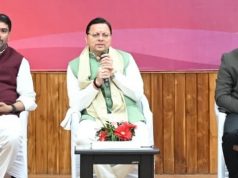Garhwal Post Bureau
Dehradun, 5 Sep: Uttarakhand has registered a substantial decline in its Maternal Mortality Ratio (MMR), reflecting the impact of sustained policy interventions and grassroots efforts. As per the latest special bulletin on maternal mortality in India, the state’s MMR has dropped from 104 in the period 2020–22 to 91 in 2021–23, marking a reduction of 13 points and a 12.5 per cent decrease in maternal deaths within a year.
On this accomplishment, Chief Minister Pushkar Singh Dhami has claimed that it was a result of the state government’s dedicated policies, the relentless hard work of health workers, and community participation. He reiterated his resolve to continue with sustained efforts to further strengthen maternal health.
Speaking on the occasion, Secretary, Medical Health and Medical Education, Dr R Rajesh Kumar, emphasised that maternal health remains a top priority for the state. He stated that the achievement was the result of coordinated efforts by health personnel, government institutions, and community stakeholders. He reiterated the department’s determination to further reduce maternal mortality and ensure that every pregnant woman receives safe and dignified delivery services.
The officials say that the state’s success is a result of several key initiatives. The Maternal Death Surveillance and Response (MDSR) system has enabled timely reporting and detailed analysis of each maternal death, facilitating prompt corrective action. The Birth Preparedness and Complication Readiness (BPCR) programme has focused on early identification of risk signs among pregnant women and their families, ensuring readiness for emergencies. It has also been claimed that quality improvement measures have included the expansion of LaQshya-certified delivery rooms and maternity operation theatres, aimed at providing clean, safe, and respectful care.
According to the Health Secretary, institutional deliveries have been promoted through robust implementation of Janani Suraksha Yojana (JSY) and Janani Shishu Suraksha Karyakram (JSSK), offering free and inclusive maternal and newborn services. Emergency transport systems have been strengthened with enhanced 108 and 102 ambulance services and GPS-enabled referral protocols. The Pulse Anaemia Mega Campaign has facilitated haemoglobin testing and targeted treatment for over 57,000 pregnant women, with a second phase planned to extend screening at the community level.
Dr Kumar asserted that community participation has also played a vital role, with antenatal and postnatal care services being delivered through a network of Accredited Social Health Activists (ASHAs), Auxiliary Nurse Midwives (ANMs), and Community Health Officers (CHOs), ensuring outreach to the remotest areas.
Dr Kumar reiterated that this achievement stands as a testament to the government’s steadfast commitment to maternal health. He affirmed that the state aims to eliminate preventable maternal deaths and establish Uttarakhand as a model for safe motherhood across the country.







